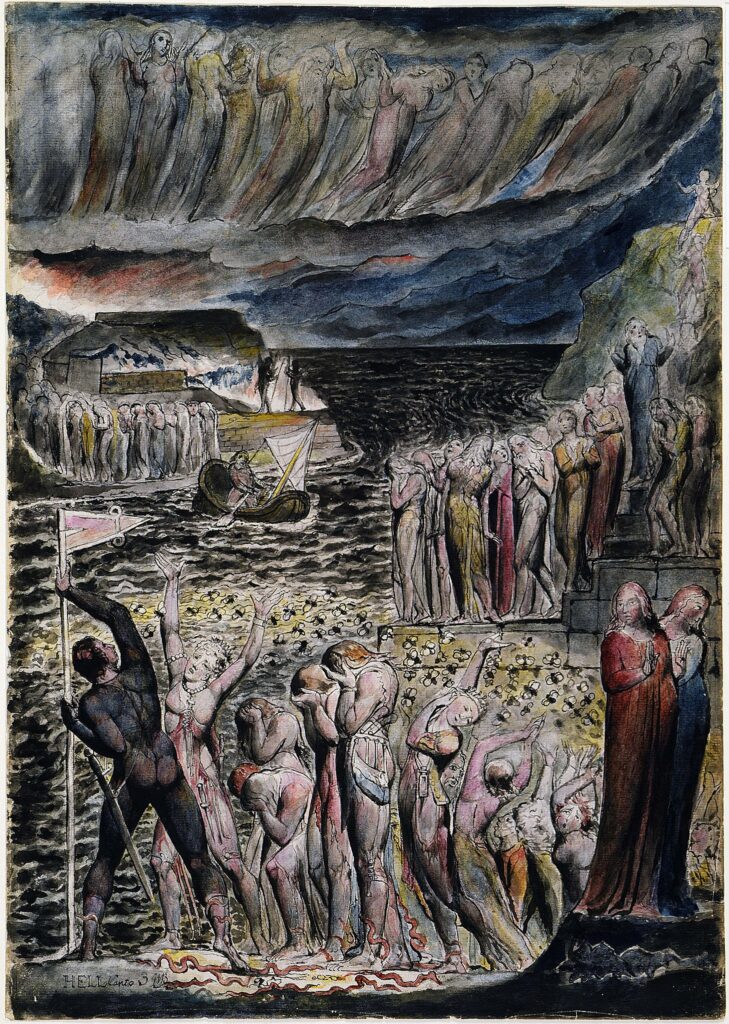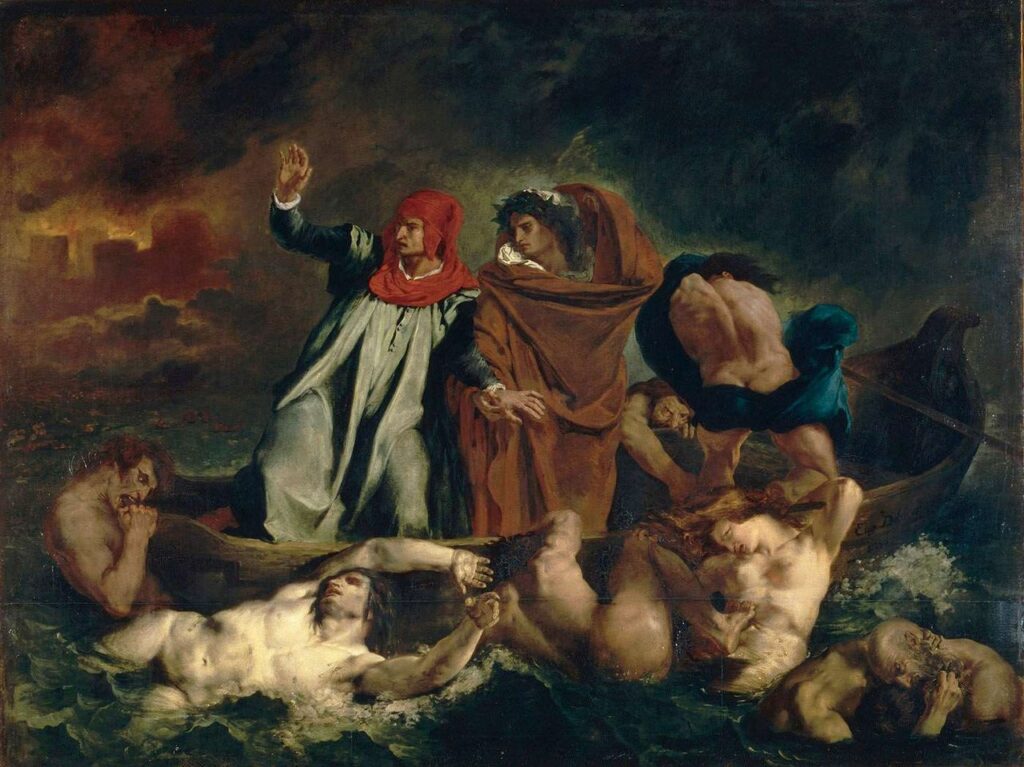In some mythologies the topography is fairly clear. Tolkien even included detailed maps in ‘The Lord of the Rings‘. The writers of ancient Greece and Rome were much less specific, though. We might be told about the need to pay a ferryman to cross the River Styx, but do you turn left or right for the Elysian Fields once you disembark? Where is the palace of Hades, where Persephone / Proserpine spends half the year? Are the Rivers Cocytus and Acheron tributaries of the Styx or other names for it?
Of course, we should not expect detailed directions since not many people have been there and come back to tell the tale. Orpheus tried but it did not work out for him. At the end of Plato’s Republic we are told about Er, who accompanied some colleagues to the underworld and was able to give a few vague details because, unlike them, he did not drink the waters of the River Lethe (aka Forgetfulness, Amnesia). Maybe the most famous visitor to make a successful return was Herakles / Hercules, whose final ‘labour’ was to bring back Cerberus, the multi-headed guard dog of the underworld. It was because of this exploit that the god Dionysus asks him for travel tips in Aristophanes’ comedy, The Frogs. Even in ancient Athens people were not sure about the best way to get to the underworld or the layout of the place.
Dionysus:
Well, that’s it! That’s exactly the sort of longing and passion I suddenly got, and it was for… Euripides!
Heracles:
But he’s carked it! Dead! Deceased! No longer upon our world! He’s down there! Down below! Passed down!
Dionysus:
I know, I know, but I must go! I must go after him! Down below and no one, not even you can stop me, big brother!
Heracles:
But… where? He’s down with Hades, I tell you!
Xanthias shakes with fear, kicks the donkey and farts.
Dionysus:
To Hades and below that even! That is if there is a “below” Hades!
Heracles:
But…. what on earth for? What are you after, little brother?
Dionysus: (Stares forlornly, romantically at the sky.)
Oh… I need… I need a good poet, Heracles. Ah! Euripides! Remember what he said? He’s the one who said, “some poets have died and those who are still around are shocking!” What a clever poet our Euripides was!
Heracles:
But, what about Iophon, Sophocles’ son. He’s still around isn’t he?
Dionysus:
He and only he, unfortunately! And I’m not that certain that he’s that crash hot either!
Heracles:
Well, if you must bring someone back from the dead, why not Sophocles who’s far better than Euripides?
Dionysus:
No, first I’ll grab Iophon all by himself, take him away from his pappy and see what he can do on his own. In any case, Euripides is a sly and crafty, sharp old bugger and he could most probably think up of some way of us getting out of Hades' clutches; whereas Sophocles, well, you know Sophocles: he was a woos up here and he’d be a woos down there. No spunk, no love for adventure!
Heracles:
And our little Agathon?
Dionysus: (Forlornly again)
Ahhhhh our beautiful, beautiful Agathon!
Heracles:
Where is he?
Dionysus: (Absent mindedly)
Ey? Oh! That lovely handsome boy has gone and left me! Tsoof! Took off with his lover Pausanias. What a waste! He’s most sorely missed by all of his friends around here.
Heracles:
Where did the little beauty go?
Dionysus:
Went off to slurp with the Blessed!
. . . . . . . . .
Heracles:
But what about all the others? A million and more young boys, writing a million and more tragedies, spitting out more words than Euripides could ever spit!
Dionysus:
Heracles, I’m looking for a real craftsman. One whose words are lofty, poetic. You won’t find them here any more, I tell you. Those kids you’re talking about are just loud mouths, producing scraps for the dogs, idle crappings of crapping birds who, as soon as someone gives them a cast of actors, they piss and shit on Tragedy and then leave. Nah, there’s no virile poet to be found anywhere. (Shouts at the audience) Find me a poet who knows the noble word!
Heracles:
Virile? What do you mean, virile?
Dionysus:
Virile! Fructiferous! Juicy! One who can glue syllables together to produce the most delightful thought. Like “Oh, Ether, Zeus’ Bedchamber!” (Donkey farts) or “Foot of Time” or “Oh heart, that won’t swear upon the sacrifices, Oh, tongue that swears so falsely, so distant from the heart!”
Xanthias farts
Heracles: (mocking)
You like that sort of stuff?
Dionysus:
Ohhhhh! It’s beautiful! It drives me crazy!
Heracles:
It’s pure crap and you know it!
Dionysus:
Like Andromeda said, big brother, “you keep your thoughts in your skull and I’ll keep mine in my skull!”
Heracles:
They seem painfully “undelightful” to me! Totally artless!
Dionysus:
The only art you’ll ever know is the art of the gut! I’ll let you teach me about that later if you want but leave poetry to me!
Xanthias:
Still not a word! (To the audience, pleading)
Not one single word about me! Oh, my shoulder! (Stretches and whirls it around. Kicks the donkey.)
Dionysus:
Now listen! The reason I’ve come to you wearing this get-up of yours is so that I’ll get to look like you and then you can tell me all about those friends of yours who looked after you when you went after that three-headed monster, Cerberus… Hades’ bouncer… Just in case I need those friends of yours when I get down there…
Xanthias: (Exasperated, his shoulder aching, he stretches and whirls his arm around again. Yells to the audience.)
Oi! What about my shoulder?
(He makes an armpit fart. A second later his donkey farts in support).
Heracles: (He shakes his head violently)
You’re mad, you silly little bastard, you’re mad! You wouldn’t wanna go down there too! You couldn’t!
Dionysus:
Drop the arguing. Just tell me the quick way I could get down there! To Hades! And I mean the quick way… just skip all those roads that are too hot or too cold!
Heracles:
All right then… let me see… which one should I suggest first? There’s the one where you’ll need a bench and a rope.… you… hang yourself and… tsoof, you’re there!
Dionysus: (is repulsed by the thought)
Nanananananahhh! Toooo…. toooo hangy!
Heracles:
Well… there’s the shortcut… well worn, this one. The mortar and pestle.
Dionysus: (He’s frightened by this one)
Ouch! You mean the hemlock?
Heracles:
Exactly.
Dionysus:
Brrrrrr! Nanananananananah! Too chilly! Freezey weezy! Chills your shins all the way up to your… (caresses his phallus)
Heracles:
Finds the perfect way!
Ah, huh!You want to know the fastest way down?
Dionysus:
By Zeus, yes! I hate walking around for ever.
Heracles:
Then you just walk a little bit. Just up to Keramicos.
Dionysus:
Yes?
Heracles:
Climb the high tower…
Dionysus:
Yes?
Heracles:
And wait for the torch race to begin.
Dionysus:
Yes, yes?
Heracles:
Well, as soon as you hear the crowd yell, “and they’re off” you get off, too!
Dionysus:
Get off? Get off to where?
Heracles:
What do you mean where? Down, of course! You jump!
Dionysus:
Oh, nononononononononoh! Boof! Two brain omelettes splattered everywhere! Wasteful! No, oh, no! I don’t think I want to take that little walk.
Heracles:
So what will you do then?
Dionysus:
I’ll go the way you went!
Heracles:
Wooooooow! That’s the longest way! It’s a huge trip that one.
(Sees that Dionysus looks determined and gives up.)
All right, then. Look: First you’ll come to a huuuuuge lake. An abyss, it is!
(sees that Dionysus doesn’t know the word)
That means Bottomless!
Donkey farts
Dionysus: (Shifts in discomfort. Stretches and whirls his arm about like Xanthias did moments earlier.)
Sooooo… how do I get to the other side of that lake?
Heracles:
On a tiny boat, by a very old sailor. He’ll take a two-obol fare. Same as the fare to the theatre.
Dionysus:
Well, will you look at that! The power of two obols hey? Everywhere you go: two obols please, two obols please. But how did they get down there?
Heracles:
Theseus took them down there with him.(Dionysus still doesn’t understand)
When he went down to bring Persephone up…. (Dionysus nods understanding and Heracles gets back to the directions.)
After you cross that lake, you’ll see millions of snakes and beasts and things that are too horrible to contemplate.
Dionysus: (Shaking and stuttering with fear)
Now, now, big brother, don’t try to frighten me, or put me off, or anything! I’m not that easily shhhhscared!
Alternate farts from Xanthias and the Donkey.
Heracles:
All right then.
Then, let’s see. What’s next? Ah! Then you’ll see a huge swamp. Mud and shit everywhere; but everywhere! That’s where they drown all the nasty people. You know, the ones who’ve wronged a stranger, say, or ran off without paying the boy they screwed, or beaten his parents. Those who swore a false oath, or got someone to plagiarise Aeschylus’ grand-nephew, Morsimus.
(pinches his nose)
Talk about bad poetry! Pooh!
Dionysus: (In agreement about Morsimus)
And, by the gods, we should also throw in there anyone who’s learnt that awful war dance by Kinesias! Awful! Awful! Totally awful! Crap!
(Spits in disgust)
Heracles:
The next thing that’ll happen is that you’ll hear a lovely breath of pipes floating all around your ears and then the most delightful sunlight will flood your eyeballs… just like here, on earth and there’ll be myrtles and groups of happy men and women, all clapping their hands together.
Dionysus:
And who are these people?
Heracles:
The Initiates.
Xanthias: (Angry)
Huh! The Initiates! The sacred mysteries! The only part played by the donkey and where the slave plays the part of the carrying of the burdens! The mysteries! Here’s what I think of them! Never again!
(Throws down the luggage, making a loud noise.)
Heracles: (Takes no notice of Xanthias’ tantrum)
Well, these Initiates will tell you all you need to know about your journey. They live very close by the road you’ll be taking. They’re next to Pluto’s palace gates… Oh well, all the best, little brother! Good Luck!
Heracles waves good bye and goes inside.
Dionysus: (responds to Heracles)
Thanks, big brother. You, too!
From Aristophanes, The Frogs (first performed 405 BCE), English translation by George Theodorides
https://www.poetryintranslation.com/PITBR/Greek/Frogs.php

William Blake, The Vestibule of Hell and Souls Mustering to Cross the Acheron, 1824-27
☙
Descendant of:
RELIGIONTexts with this theme:
- Am See (Sitz ich im Gras), D 124 (Johann Baptist Mayrhofer)
- Augenlied, D 297 (Johann Baptist Mayrhofer)
- Hektors Abschied, D 312 (Friedrich von Schiller)
- Klage der Ceres, D 323 (Friedrich von Schiller)
- An Schwager Kronos, D 369 (Johann Wolfgang von Goethe)
- Laura am Klavier, D 388 (Friedrich von Schiller)
- Lied des Orpheus, als er in die Hölle ging, D 474 (Johann Georg Jacobi)
- Fahrt zum Hades, D 526 (Johann Baptist Mayrhofer)


